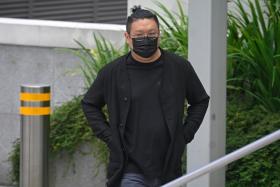NUS peeping tom case: Why culprit wasn't prosecuted; police rebut untruths
Student who filmed female undergrad showering was given warning because he showed high likelihood of rehabilitation, say police
A sex offender at the National University of Singapore (NUS) escaped with a warning because he showed a high likelihood of rehabilitation, among other factors.
Explaining their decision not to prosecute the male undergraduate in a statement yesterday, the police said he was remorseful, and a permanent criminal record could have ruined his future.
Instead, he was given a 12-month conditional warning. This means that if he commits another criminal offence within 12 months, he can be prosecuted for both offences.
The undergrad had filmed a female student showering without her consent at student residence Eusoff Hall last November.
Apart from the police warning, he was also suspended for a semester, banned from entering Eusoff Hall, made to undergo mandatory counselling, and told to apologise to his victim after an NUS disciplinary hearing.
Last Friday, third-year communications and new media student Monica Baey, 23, went on social media to complain about how the case had been handled by the police and NUS.
She felt the culprit, whom she identified as Mr Nicholas Lim, 23, a chemical engineering student, had got off lightly.
Her posts sparked calls from within and outside NUS for him to be punished more severely.
MINISTER
Law and Home Affairs Minister K. Shanmugam said in a Facebook post yesterday that he had asked the police to clarify their position on the case.
Explaining their approach in investigating the case, the police said that when recommending prosecution for a criminal offence, they consider the age of the accused, the likelihood of re-offending and other aggravating factors, including the circulation of offending images.
In this case, no other obscene materials were found on any of his devices.
The police also said a prosecution, with a possible jail sentence, would likely have ruined his entire future with a permanent criminal record.
They added: "Our criminal justice system seeks to temper punishment and deterrence with giving offenders a second chance to reform, based on assessment of the relevant factors."
The police also rebutted allegations circulating online that the man was not prosecuted because of his influential parents.
Revealing that his father is a driver in the public transport sector and his mother a housewife and noting that such factors are irrelevant, they said: "It is unfortunate that such untruths have been put out."
As for online comparisons of this case with another where an offender was jailed for 10 weeks for filming a woman showering at Republic Polytechnic (RP) in 2015, the police said the latter had committed multiple criminal trespass offences over four months.
He also avoided detection by covering his face with a towel, and did not own up voluntarily.
Former deputy public prosecutor Tan Hee Joek told The New Paper: "When young offenders with no criminal record are being dealt with, rehabilitation usually features strongly instead of deterrence and retribution.
"This is especially so where aggravating factors are absent."
But criminal lawyer Josephus Tan, founder of Invictus Law Corporation, said that while rehabilitation is an important consideration, especially for young first-time offenders, not prosecuting could also have detrimental effects.
He said that issuing a warning for a sexual offence on a school campus could affect the "assurance" of the victim and others, which likely led to the current public disquiet.
Mr Tan added: "As the saying goes, 'Not only must justice be done, it must also be seen to be done'."
Get The New Paper on your phone with the free TNP app. Download from the Apple App Store or Google Play Store now




